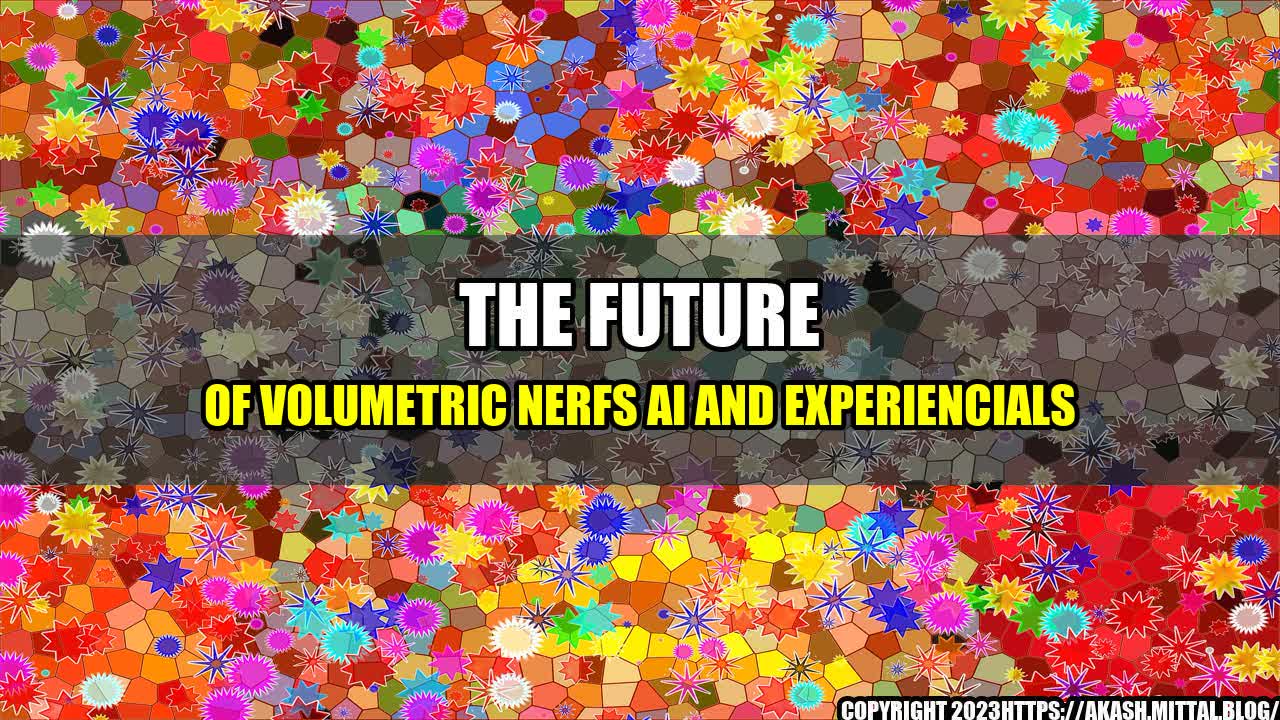Imagine you're a doctor looking at a CT scan of a patient with a rare condition. You've never treated this condition before, and there's very little information available on how to best proceed. But with the help of volumetric NeRFs AI, you're able to visualize the patient's anatomy in 3D and simulate different treatment options before even touching them.
This scenario is no longer science fiction. The future of volumetric NeRFs AI and experiencials is here, and it's changing the way we approach healthcare, entertainment, and beyond.
What are Volumetric NeRFs AI?
Volumetric NeRFs AI, or neural radiance fields, are a type of AI that can create detailed 3D models of objects or scenes from 2D images or videos. This technology is based on deep learning algorithms that can learn the complex relationships between different parts of an object, and use that information to create a high-quality 3D representation of it.
One example of this technology in action is the creation of digital humans for movies and video games. In the past, creating realistic 3D models of humans was incredibly time-consuming and expensive. But with volumetric NeRFs AI, it's now possible to create a photorealistic 3D model of a human using just a few photos or videos as input.

Examples of Volumetric NeRFs AI
So what are some examples of volumetric NeRFs AI in action? Here are a few:
- Medical imaging: As mentioned earlier, volumetric NeRFs AI can help doctors visualize complex medical conditions in 3D and simulate different treatment options before performing any procedures. This can lead to better outcomes and fewer complications.
- Virtual reality: Volumetric NeRFs AI can be used to create highly realistic virtual environments for use in virtual reality experiences. This could lead to more immersive and engaging VR experiences for users.
- Product design: Volumetric NeRFs AI can be used to create 3D models of products during the design phase, allowing designers to see how they will look and function before creating physical prototypes. This can save time and money in the design process.
Experiencials and their Role in the Future
Experiencials is another trend that's shaping the future of technology. Experiencials are immersive and interactive experiences that blur the line between reality and digital interaction.
One example of experiencials is the use of augmented reality (AR) in advertising. Brands can create AR experiences that allow customers to interact with products in a virtual space, providing a more engaging and memorable experience that can drive sales.
Another example is the use of experiential marketing, where brands create unique and immersive experiences that allow customers to engage with products in new and exciting ways. This can lead to increased brand loyalty and awareness.
The Future of Volumetric NeRFs AI and Experiencials
So what does the future hold for volumetric NeRFs AI and experiencials? Here are a few predictions:
- Advancements in volumetric NeRFs AI will lead to even more realistic and detailed 3D models, allowing for more applications in fields such as engineering and architecture.
- Experiencials will become even more immersive and interactive, with the use of technologies such as virtual reality, haptic feedback, and brain-computer interfaces.
- The combination of volumetric NeRFs AI and experiencials will revolutionize industries such as healthcare, education, and entertainment, providing new ways for people to learn, communicate, and experience the world around them.
Conclusion
Volumetric NeRFs AI and experiencials are two trends that are shaping the future of technology. While they may seem unrelated, the combination of these two technologies has the potential to revolutionize industries and change the way we interact with the world around us.
The future of volumetric NeRFs AI and experiencials is exciting and full of possibilities. Whether it's creating better healthcare outcomes, more engaging entertainment experiences, or more efficient product design, these technologies are poised to transform the world in ways we can't even imagine.

Curated by Team Akash.Mittal.Blog
Share on Twitter Share on LinkedIn